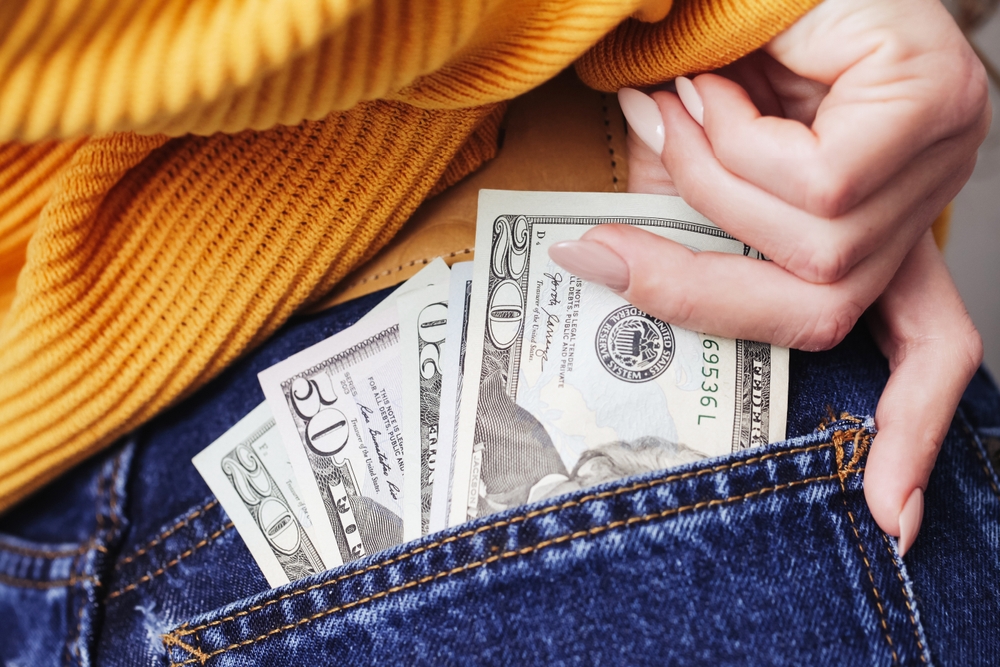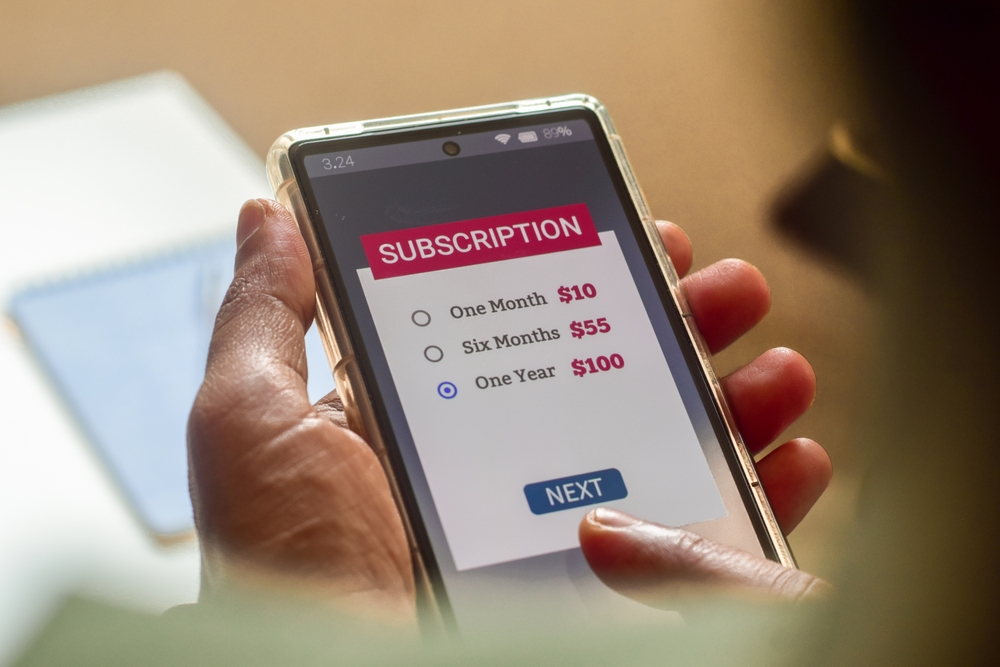In a world where avocado toast and artisanal lattes seem to hold a higher priority than saving for a rainy day, it’s all too easy to let spending habits spiral out of control. Sure, retail therapy is delightful, and a well-curated Instagram feed offers endless temptations. Yet, when the credit card statement arrives, reality tends to hit like a frigid gust of wind. If you’re nodding along, you might just be living beyond your means. Here’s your wake-up call, lovingly packaged in the form of 13 telltale signs you spend way more money than you earn.
1. Your Payday Feels Like Winning The Lottery

You know the feeling: the second your paycheck hits the bank, it’s as if the world bursts into fireworks and your heart sings a little tune. You rush to clear your online shopping cart, treating yourself to items you’ve “needed” for weeks. But by the end of the week, your account balance is already gasping for air. A survey from CareerBuilder found that 78% of American workers live paycheck to paycheck, and it seems you might be one of them.
This cycle of euphoria followed by financial panic is a telltale sign that your spending is out of control. The excitement fades as quickly as it came, and you’re left counting down the days until the next deposit. It’s a rollercoaster of emotions, with your bank account as the unwilling participant. The high can be addictive, but the lows will inevitably come crashing down.
2. You Treat Your Credit Card Limit It’s Flexible

The day your credit card company raised your limit felt like winning the lottery. You took it as a sign that you were doing well financially, maybe even making progress. What it really was, was a siren call to spend more—a challenge you eagerly accepted. Each swipe felt like an accomplishment, pushing you closer to that shiny new limit.
In reality, your credit card should be a tool, not an invitation to spend more than you have. If you find yourself viewing your limit as a target, it’s time to reassess. This mindset not only traps you in debt but also erodes your financial security. Breaking free from this cycle means recognizing credit as borrowed time, not free money.
3. You Have Never Saved A Dime In Your Life Savings

If your savings account is a barren wasteland, you might be spending more than you should. You often convince yourself that once you hit the next pay raise, then you’ll start saving. But when that raise comes, somehow, your expenses have mysteriously expanded to match it. A Bankrate survey reveals that about 21% of Americans have nothing saved for emergencies, and it’s a club you might be reluctantly joining.
The absence of a safety net is stressful but acknowledging it is the first step towards change. You see, habits are hard to break, especially when instant gratification is so enticing. The future feels distant and abstract, but in reality, it’s a mirror reflecting your current habits. Creating even a modest emergency fund is a rebellious act in a culture that glorifies spending.
4. You’re Stuck In The Scarcity Mindset

You may find yourself feeling like there’s never enough, whether it’s money, clothes, or the latest tech gadget. This scarcity mindset drives an insatiable need to accumulate more, often beyond your means. It’s almost as if you’re racing against an invisible clock, fearing that once this opportunity is gone, it’s gone for good. Oddly enough, this mindset often leads you to spend more in an effort to fill that endless void.
The scarcity mindset fuels a vicious cycle of dissatisfaction and impulse buying. When you’re always on the hunt for the next thing, you’re never truly satisfied with what you have. This constant yearning can strain your finances and mental health alike. Breaking free requires shifting focus from acquisition to appreciation—of what you already have, and what truly matters.
5. You Literally Live To Shop

We all know the allure of a new purchase, the rush of excitement, the temporary euphoria. For you, shopping isn’t just a transaction; it’s an emotional experience, a quick fix for a bad day. You might think this habit is harmless, but according to a study by the Journal of Consumer Psychology, it can be as addictive as substance abuse, leading to a cycle of dependence and guilt.
This habit isn’t just a drain on your finances; it’s a Band-Aid on deeper issues. Retail therapy provides a fleeting sense of control, but it can’t substitute for real emotional fulfillment. When the thrill fades, you’re left with buyer’s remorse and a lighter wallet. Recognizing this pattern is a vital step toward finding healthier ways to cope with life’s ups and downs.
6. You’re Constantly Dodging Bills

Your mailbox has become a graveyard of unopened envelopes, each one a reminder of your overdue obligations. You’ve mastered the art of juggling bills like a circus performer, prioritizing some while letting others slip through the cracks. It’s a delicate balance, teetering on the brink of financial chaos. You tell yourself you’ll catch up next month, but deep down, you know it’s a lie.
Dodging bills is more than just a financial misstep; it’s a ticking time bomb. You’re not only risking late fees and damage to your credit but also your peace of mind. This habit can quickly spiral, leading to a cycle of debt that feels impossible to break. Confronting your bills head-on, however daunting, is the first step toward regaining control.
7. You Rationalize Every Purchase

For every impulsive buy, you’ve got a perfectly reasonable justification—or so you think. Whether it’s treating yourself for a job well done or buying “just in case,” your spending is always accompanied by a rationalization. A study published in the Journal of Economic Psychology highlights how people often use reasoning to justify irrational spending behaviors, tricking themselves into believing it’s okay.
This mindset is a clever enabler, allowing you to skirt the guilt associated with overspending. Each excuse chips away at your financial well-being, inching you closer to a precarious edge. When every purchase feels justified, it’s easy to lose track of what’s necessary and what’s not. Recognizing these rationalizations for what they are is crucial to curbing your spending and reclaiming financial control.
8. You’re Afraid To Check Your Bank Account

Your bank account balance feels like a monster lurking under the bed—best left unseen and unacknowledged. You find yourself averting your eyes at the ATM, or swiping your card with fingers crossed, hoping there’s enough to cover the purchase. This fear of facing your financial reality is a clear sign you’re spending beyond your means. It’s as if ignorance might somehow make the problem disappear.
Avoiding your account balance only delays the inevitable reckoning. The longer you dodge the truth, the worse the fallout will be when you finally confront it. This avoidance is more a symptom than a solution, keeping you in a state of perpetual anxiety. Facing your financial fears is the only way to start making meaningful changes and regain control over your money.
9. You Borrow From Friends Or Family Regularly

You’ve become adept at spinning tales of temporary woes, convincing friends or family to lend you money “just this once.” But these instances have become more frequent, each one a patch over a widening financial chasm. You promise yourself and them that this is the last time, yet the cycle repeats. This reliance on others is a glaring sign of overspending and financial instability.
Borrowing money, especially from loved ones, can strain relationships and create a sense of dependency. The occasional loan might be understandable, but chronic borrowing indicates deeper issues. It’s a temporary solution to a persistent problem, one that can erode trust and cause tension. Acknowledging this pattern is crucial to finding sustainable solutions and restoring balance to both your finances and relationships.
10. You Rely Heavily On “Buy Now, Pay Later” Schemes

Those tempting “buy now, pay later” offers feel like a lifesaver in the moment. They allow you to indulge your desires without immediate financial consequences, but these deals often come with hidden costs. You tell yourself it’s a smart way to manage cash flow, but in reality, it’s a slippery slope into debt. The illusion of affordability masks the true impact on your finances.
These schemes are seductive, offering instant gratification while deferring the pain. Yet, as those installments pile up, they become a burden you didn’t anticipate. The convenience of spreading payments can lead to overspending, as you lose track of how much you’ve committed to pay. Recognizing the long-term cost of these arrangements is key to protecting your financial health.
11. You Avoid Financial Conversations

The mere mention of finances sends a chill down your spine, and you deftly steer conversations elsewhere. You’re not just avoiding awkwardness; you’re avoiding accountability and reality. Financial discussions at dinner parties or with your partner feel as appealing as a root canal. This aversion signals an unhealthy relationship with your finances.
Dodging these conversations might provide temporary relief, but it also keeps you in the dark about your financial health. Transparency is crucial in building a stable financial future and avoiding pitfalls. Embracing these discussions, rather than shying away from them, can empower you to take control. After all, understanding your financial situation is the first step in changing it.
12. Your Closet Is Bursting At The Seems

Every morning, you stare into a closet bursting with clothes, yet the familiar lament escapes your lips: “I have nothing to wear.” This paradox is a sign that shopping has become less about need and more about impulse. You’ve accumulated a wardrobe full of items that caught your eye, but few that truly serve you. It’s a cycle of dissatisfaction and relentless consumption.
This pattern reflects a deeper sense of unfulfillment, masked by material accumulation. You chase trends and indulge whims, yet your closet never seems complete. This insatiable need for more stems from a disconnect between what you buy and what you truly value. Reevaluating your purchases with intention can lead to a wardrobe—and a life—that truly fits.
13. Your Lifestyle Outpaces Your Income

You’ve crafted a life that radiates success and sophistication, but it’s built on shaky financial foundations. From trendy brunch spots to designer handbags, you curate an image of affluence that doesn’t match your bank balance. It’s an enticing facade, but one that’s proving unsustainable. Your lifestyle has become a performance, one that’s costing you more than just money.
Living beyond your means is like teetering on a high wire, exhilarating yet perilous. The pressure to maintain appearances can drain your resources and your spirit. This habit of projecting an image of wealth while silently drowning in debt is a trap many fall into. Embracing authenticity and realigning your lifestyle with your actual income is the key to finding genuine fulfillment.
This article is for informational purposes only and should not be construed as financial advice. Consult a financial professional before making investment or other financial decisions. The author and publisher make no warranties of any kind.








